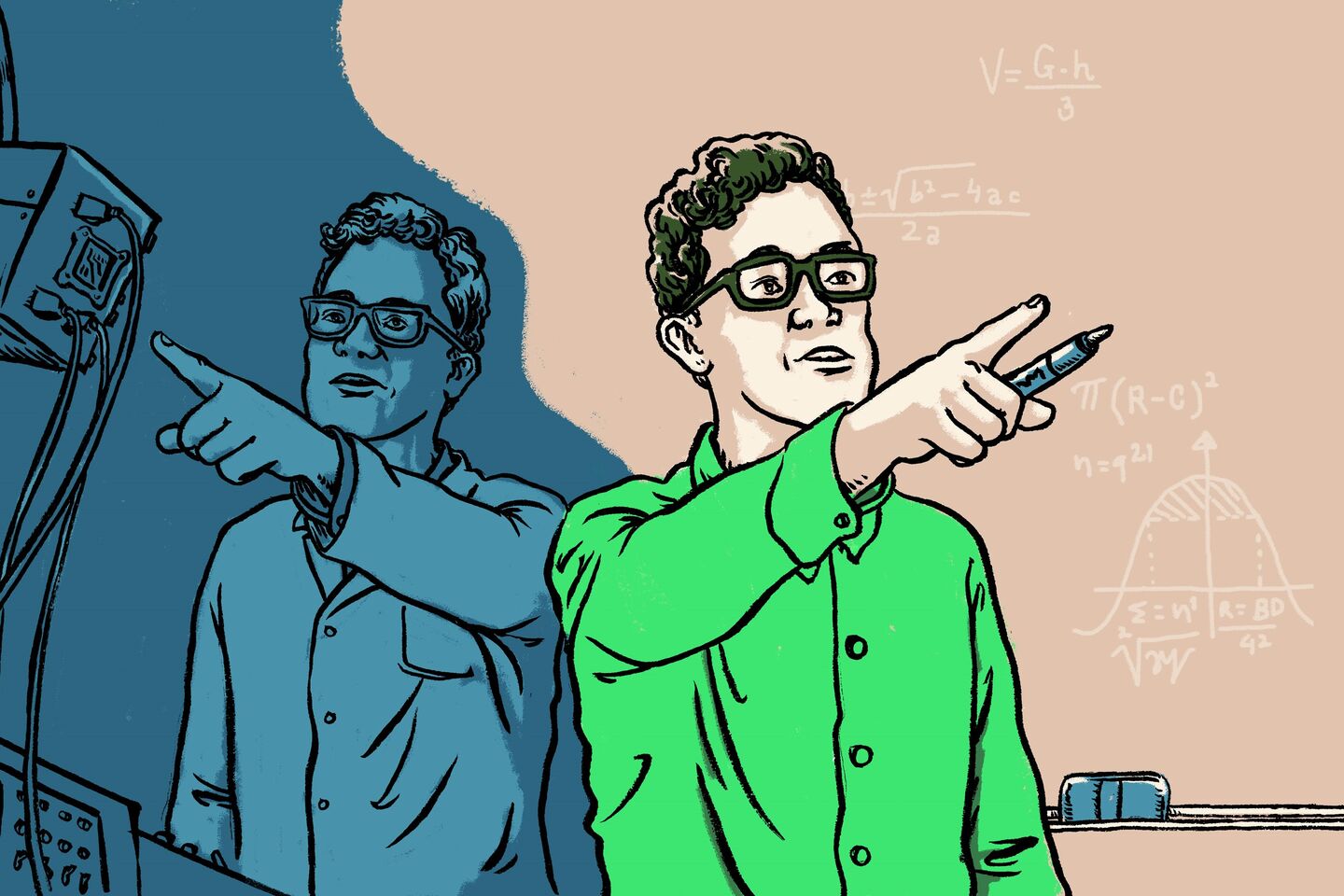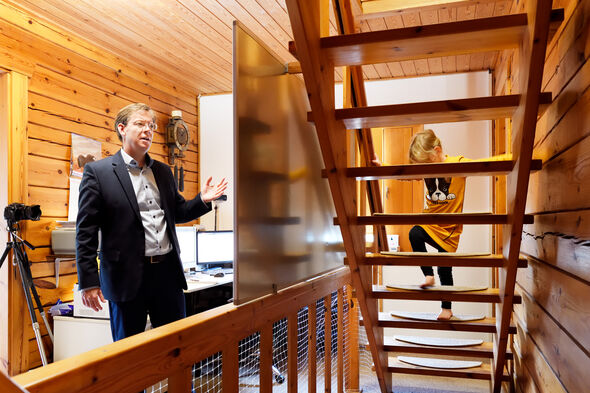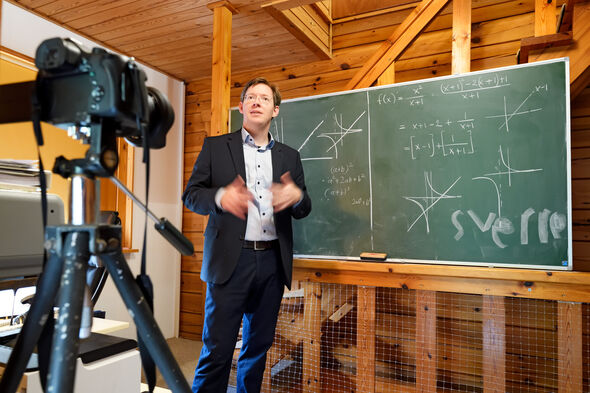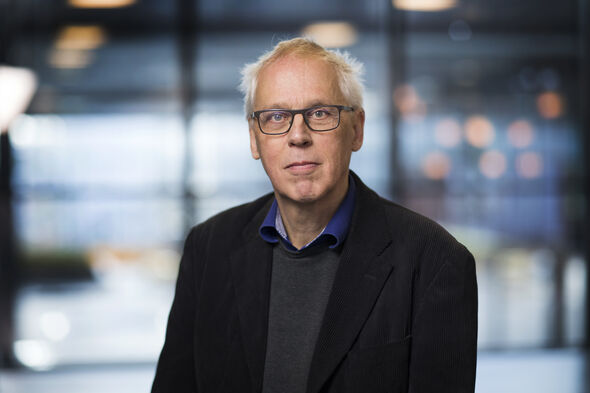
Teaching appears to be a calling
Forget about making money
In this sequence of a two-part article about choosing a career in education, we talk to dr. Hjalmar Mulders and prof. Ward Cottaar. One of them made a deliberate choice very early on in his career to become a teacher, the other made the switch by chance. Both gentlemen call for more teachers with an academic background. But it will take more recognition of teachers and greater awareness of TU/e’s education master’s program before we get to that point.
When the camera turns on, I see Hjalmar Mulders, teacher at the department of Applied Physics, and something in his home immediately makes me think of education: a blackboard hanging on the wall. After a few questions, I learn that Mulders has no fewer than three (!) cameras at his home with which he records short videos from different angles, so that his students won’t get bored or have to look at images that seem unnatural. “When you look at modern videos, you’ll notice that the angle changes every few seconds, so that’s what I wanted as well. And editing videos isn’t that difficult at all. TU/e offers online courses that teach you how to do it.”
Mulders likes to go the extra mile to ensure excellent (online) education. He didn’t retrain as a teacher, but he did turn his gaze beyond the university towards higher education. “I graduated at TU/e as a plasma physicist in 2010 and conducted research into plasma radiation and the northern lights, among other things. I knew early on in my career that I wanted to work in education. I love to teach and to think about how you can convey things to students. But that’s not always easy: you need to interact with students. And during online lectures in times of corona, that’s a more serious challenge now than before.”
Highschool students of today
Mulders: “I teach a lot of courses designed for first-year students. I feel that we as a university don’t really know who those students are in the year 2020. Many teachers think that high-school hasn’t changed since they themselves graduated back in 1992. I’m forty years old, but high-school has already changed significantly in the years since I left. Students today have different skills and expectations when they start here. They are less proficient at math, but they are more trained at information processing and collaboration.”
We need to turn the new students into academics at some point, and that requires them to take the initiative. That’s something we need to instill in them.
Mulders also taught high school students (senior general secondary education and pre-university education) as part of an exchange program between TU/e and the Beatrix College in Tilburg. “The students learned a lot from me, but it was me who learned the most: what’s life like at high school today, what do students find interesting, what do they want? What struck me is what they wanted from me. When I ask second-year students or senior students at the university what they would like me to do, they say: ‘make the calculations and we will watch.’ When I ask high school students that same question, the answer is: ‘can we go home?’ Later, I realized where that came from: the prevailing culture at high school is one of ‘you have to.’ You have to be in class on time, you have to finish your homework, there are mandatory hours of homework, you have to make a study choice and a profile project. And there’s always a sanction when you don’t comply. So, it actually makes sense that they don’t know what they want, because they never have to decide that themselves. When given a choice, they prefer to do nothing, because they have to do so much already. The same thing happens to first-year students at our university: they run into problems. They don’t know how it works once they get to a university, because suddenly there’s no one telling them what to do all the time. Of course, it helps to verify their presence and to require them to do their homework, but we need to turn them into academics at some point, and that requires them to take the initiative. That’s something we need to instill in new students.”
Choosing a career in education after 26 years
Ward Cottaar, currently professor of Instrumentation Design at the department of Applied Physics and director of the master’s and post-master’s program Medical Physics and Engineering, is proof that you can still start a teaching career later in life. He spent 26 years working in industry and entered the teaching profession by chance. “I studied physics, just like my wife. After having worked in the industry for many years, I became a professor at TU/e. Some years ago, my wife ran into Herman Beijerinck, the professor who supervised her when she was a graduate student. It turned out that he was looking for someone to succeed him, and I was invited over for a meeting. I was working at Philips at the time, and some changes were taking place there, so I was on the lookout for a new job. However, if there had been a vacancy for my current job, I would never have applied. I would have thought: ‘they probably don’t want me anyway, since I spent all those years working in industry'.” But nothing could be less true.
“The decision to enter a career in education was an unconscious one at first, but it became a conscious one at a certain point. I made the switch when I was 55 years old. I thought to myself: ‘I’ll work a bit less (hard) now and make a bit less money.’ The part about making less money turned out to be true, the part about working less hard didn’t, unfortunately, ha ha. Working in education can be quite demanding. I hear from other people who have made the switch from industry to education that they find it rather strenuous. If you’re in it for the money, don’t become a scientist or a teacher. You won’t get rich. But the idea is that other things are important too.”
Regret
One of the things Cottaar worked on at Philips, was the continued development of lamps. “How can we make production more energy-efficient and durable? But I also worked on medical products. I always worked at factories, for 26 years. That’s because I’m an engineer, not a researcher. There’s much you can do as a physicist, but there’s not that much work purely in the realm of physics. Sure, in science, but you come across scientists at various places outside academia. As a professor, I do quite a lot of management-related work. The PhD candidates carry out research. The fact that the most experienced people spend less time carrying out research than anyone else is rather strange, don’t you think? I spend most of my time on the PDEng programs instead of teaching bachelor’s and master’s students, but I never have prime responsibility for a bachelor’s or master’s course. That’s what working in education can also entail. I do regret that somewhat, but I’m close to my retirement now, so that won’t change anymore. I would have liked to have done more teaching. It would have allowed me to interact with students more.”
Tackling teacher shortages
“There aren’t enough teachers, so we need to promote our master’s degree program to become a teacher,” Cottaar says. “Students deal differently with their study choice now, since the study financing system has changed. They don’t ‘see whether they like’ a certain program anymore, but make a conscious decision. Having a sufficient number of students for teacher-training programs, starts with inspiring physics and math teachers in high school. They largely determine whether a student continues in exact sciences. But it’s up to us to train them; a vicious circle.”
The level of teacher recognition and appreciation in our society is simply too low, in terms of prestige, respect and rewards
But making sure that there are enough role models isn’t the only challenge, recognition is important as well. “The level of teacher recognition and appreciation in our society is simply too low, in terms of prestige, respect and rewards,” Mulders believes. “The situation at high schools isn’t that bad, but a primary school teacher salary is too limited. It’s almost better to stack supermarket shelves. That’s a flaw in our society. Teacher salaries have lagged behind the market during the last forty years. Apart from the inflation adjustment, you could argue that teacher salaries remained frozen for almost forty years.” Does that mean that being a teacher is some kind of calling? “It would seem like it. You really have to enjoy it.”
More academically trained teachers
“After five years of secondary education, I quit my teaching job at high school,” Mulders says. “I enjoyed my time there and learned a lot, but I came to realize that my strength and ambition lie in stimulating our own students. A teacher can really help people with the things they aspire to.”
Qualifying as a high school teacher took less time in the past, in fact, students could do so during their program. “It takes much extra time nowadays, and it is of little added value to a student, which leads to very few physics teachers with an academic background in high school. Pre-university high school education ('vwo' in Dutch, ed.) prepares you for a university training, and not having teachers in high school who went to a university themselves is remarkable to say the least, and frankly undesirable.”

A retraining program such as the one offered by the ESoE, incidentally, doesn’t suit everyone, Mulders thinks. “You do need to have certain talents that by no means come naturally to all science students. Working in education requires communication skills, patience, empathy. But I believe that it’s a great program for those who are right for it, and that teaching can be very rewarding. I still feel that my work has an impact on society and gives shape to our future competitiveness.”



Discussion